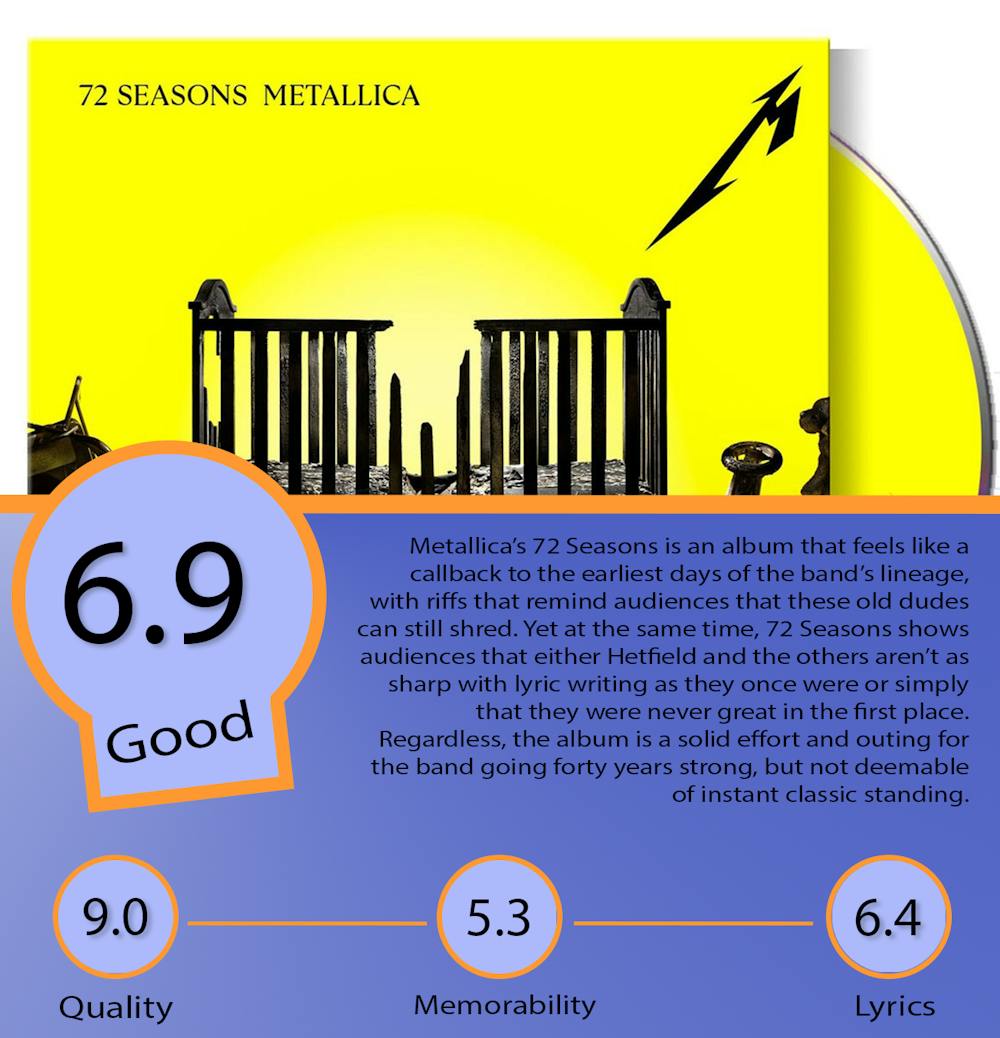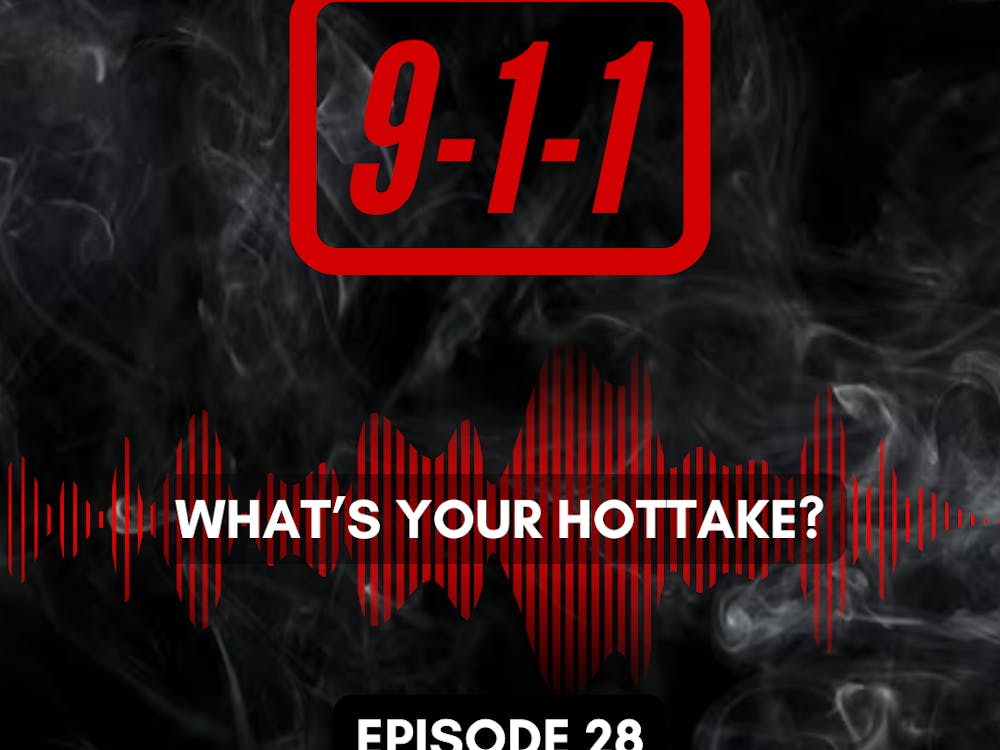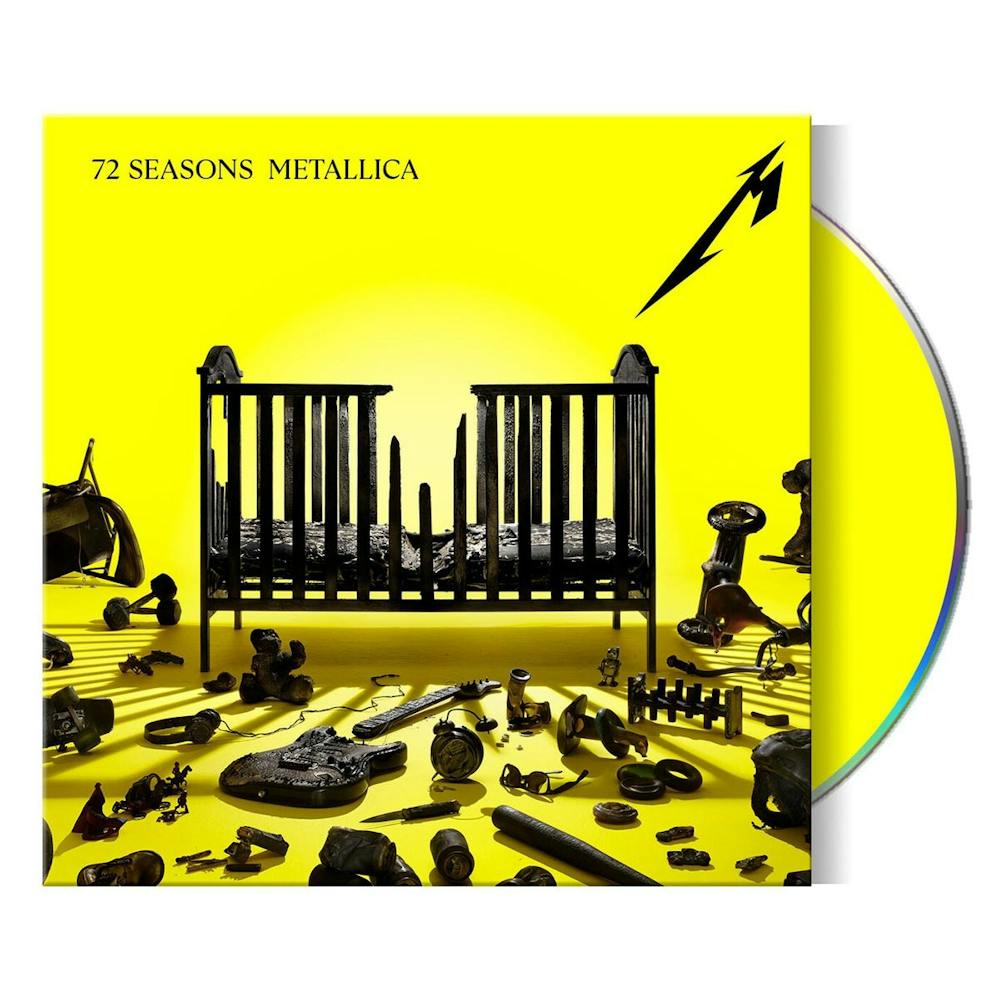The opinions and views expressed in this article are those of the author and do not reflect the opinion of Byte or Byte’s editorial board.
Since late 1981, Metallica has been crafting powerful and heavy-riffed songs that speak to the metalhead in us all. Starting with Kill ‘Em All, Metallica quickly began to fly into the rock and heavy metal scene. Of course, it wasn’t until the band released the critically rated and acclaimed album Master of Puppets that they truly found stardom. Now, just over forty years later, Metallica released their newest album—their eleventh studio album—72 Seasons. But, with all the success the band has had over the years, how does this new album stack up to its predecessors?
This sure ain’t 'St. Anger' nor 'Master of Puppets'
Over the course of the past forty years of the band, Metallica has been headlining with songs and albums that influenced and ushered in a new generation of music to audiences worldwide. Even to this day, many songs from the band’s earliest outings are regularly played, often showing up in movies and television shows. From "For Whom the Bell Tolls" in 2009’s Zombieland or "Master of Puppets" in 2022’s fourth season of Stranger Things. These earlier albums that the songs herald from are often the most highly regarded albums in the band’s history, having helped shape the band into the headliners we know today. But as the time passed, and they released more albums, they began to fall flat. So much so that the band’s attempt at something new, St. Anger, is often regarded as the worst album Metallica has ever released.

So, how does 72 Seasons compare? Well, simply put, it definitely isn’t as bad as St. Anger or any of Metallica's lesser albums. But it also isn’t in the upper echelons either. In complete honesty, 72 Seasons falls in almost the dead center of enjoyability.
The album, on various songs, such as "Room of Mirrors or "Inamorata," manages to capture the thrill and adrenaline of the older classic albums. And the vocal talents of lead singer James Hetfield—though he is in his late 50s—sound as if he had come from the past to sing these songs. On the opposite end, however, other songs (such as "Sleepwalk My Life Away" or "Screaming Suicide") sound as though they came from Hardwired…to Self-Destruct or one of the other newer albums.
However, this isn’t all bad. The recordings and the playing of all instruments, from Lars Ulrich to Kirk Hammett to James himself, are of immense quality and sound. From Hammett’s solos on most songs to Ulrich’s pace setting on the drum kit, each sound distinct and sharp no matter how you listen to it. In each facet of the songs and music of the album, there is a consistent and welcoming blend from each that helps the song come alive. No singular part stands out from the other. Unless, of course, you are listening on headphones and then the loudest part is the snare, kick, and hi-hat of the drums. Beyond that, each instrument has a moment to shine within the various songs on the album.
If Forgetfulness Had a Son, here it is…
As previously stated, Metallica has released many songs and a large handful of them have become staples that nearly everyone knows of to this day. I bet you couldn’t even walk into a Hot Topic without at least one of their songs playing. Those songs are memorable for a variety of reasons, whether due to the lyrics of songs like "Enter Sandman" or "Nothing Else Matters," or perhaps simply because of the headbanging riffs like "Master of Puppets" or "For Whom the Bell Tolls" that helped pave the way for the metal genre . Memorability is what makes Metallica a renowned band and one of the greats.

But all of the songs mentioned were in the past. What about the songs they just released? Well, simply put, I imagine that these songs will get some air time on radio throughout the years, but aren’t gonna be put in film and television. This is simply because these songs are not very memorable in either lyric or riff. But let's break it down a bit further.
72 Seasons has a tracklist of twelve songs total. Eight of these songs—"Shadows Follow," "Screaming Suicide," "Sleepwalk My Life Away," "You Must Burn!," "Lux Æterna," "Crown of Barbed Wire," "If Darkness Had a Son," and "Too Far Gone?"—fail to make a standing impact with their lyrical prowess, sounding like a generic metal song from a bygone era. Some even have lyrics that make me physically cringe and need to skip the song due to how terrible they are (looking at you, "Screaming Suicide"). I have been a longtime fan of the band for several years now, jamming out and headbanging to several of their albums, regardless of lyrical design or construction. Yet, as I listened to 72 Seasons, there was something else that stood out so heavily within these songs that they failed to do the one thing I felt they should have: impress me. This is due to the fact that James Hetfield uses the song’s name as the punchline of the chorus, even when it isn’t needed at all. It’s almost as if he wanted to make sure the audience knew which song they were listening to (which I sure didn’t need help with). As an example, here is the chorus of "Crown of Barbed Wire" (though to get a full understanding, listen to the song):
“This rusted empire I own
Bleed as I rust on this throne
Pierce me with torment
And all the rust that I own
So tight, this crown of barbed wire
So tight, this crown of barbed wire
So tight, this crown ”
It is like this for nearly every single one of the eight songs mentioned, though to each a varying degree. But, luckily as has been the case with metal songs since the early '80s, part of what makes a song good isn’t simply just the lyrics but the headbangability of the riffs played beneath them. Unfortunately, only one song out of the entirety of the twelve tracks really seemed fresh and memorable in this regard. The song "Room of Mirrors", with a recurring motif rhythm that, towards the four minute forty-five second mark, popped and stood out. Notably, for the heavy use of double bass and double lead harmonic guitar riffs. Beyond that, the other songs on the album kinda feel like classic Metallica, though not in the greatest manner. They feel generic and uninspired, as if Hetfield and the others came out of the hype and rush of buying Master of Puppets merch during the release of Stranger Things Season 4, with the notion that they should write a new album so the money train can keep coming. However, during this rush to write and design new songs, Metallica managed to create a track that, at least for me personally, stands out amongst the rest: "Inamorata". This song, now officially the band’s longest song at just over eleven minutes long, also contains lyrics that neither offend nor massively please. And in the mix, there isn’t an unnecessary Hammett solo moment—which got quite repetitive within the other songs. Instead, this song takes everything and makes it work together in a track that is appealing to the ears of new and old listeners, as well as giving a bridge that feels far more heartfelt than any other Metallica track to date.

Sources:
Spotify, Spotify, Spotify, Spotify, Spotify, IMDb, Spotify, IMDb, Spotify, Spotify, Spotify, Spotify, Spotify, Spotify, Spotify, Spotify, Spotify, Spotify, Spotify, Spotify, Spotify, Spotify
Photos:
Contact Aaron Picklesimer with comments at ampicklesimer@bsu.edu




















